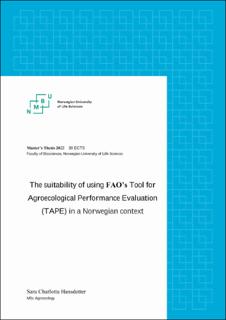| dc.description.abstract | The present agri-food system, in Norway and globally, is facing severe challenges when it comes to ecological, economic, and social sustainability. To retain the presumptions for future generations to flourish on earth, business as usual is not an option. There is an identified need to gain knowledge and evidence of how different types of agricultural production systems are contributing towards achieving a more sustainable state. However, assessing the sustainability of farming and food systems is a challenging and complex task. Methods intending to do so need to be carefully evaluated. In this study, FAO’s “Tool for Agroecological Performance Evaluation” (2019) was implemented on an organic dairy farm in Midwest Norway and evaluated for its suitability in this context.
TAPE characterizes the farming system by assessing it against principles within agroecological approaches and then evaluates its performance against dimensions considered relevant to achieve the Sustainable Development Goals (SDGs). The selected farm in this study performed best in dimensions regarding economy and efficiency and poorest in dimensions concerned with diversity. This was identified as a consequence of socioeconomic and political circumstances (the supra-system). It indicates that TAPE is an appropriate tool to identify specific characteristics of agricultural production systems and trace their potential causes to the circumstances of its supra-system. Several shortcomings and challenges for the suitability of using TAPE in a Norwegian context were identified and discussed. The main issues concerned poor adaptation of indicators to ecological, climatic, and socio-cultural conditions of Norway. However, these shortcomings were considered less relevant if TAPE is used and interpreted as a soft systems methodology, rather than a rigid method. TAPE was specifically recognized to be a promising tool to foster transformative discussions about sustainability in agricultural production systems through participatory learning processes with farmers, policymakers and other stakeholders. | |
